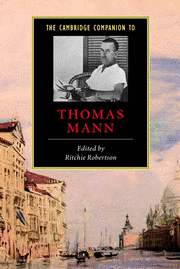Book contents
- Frontmatter
- 1 Mann and history
- 2 The intellectual world of Thomas Mann
- 3 Mann's literary techniques
- 4 Mann's man's world
- 5 Mann's early novellas
- 6 Classicism and its pitfalls
- 7 The political becomes personal
- 8 Buddenbrooks
- 9 The Magic Mountain
- 10 Religion and culture
- 11 Doctor Faustus
- 12 Lotte in Weimar
- 13 The Confessions of Felix Krull, Confidence Man
- 14 Mann as essayist
- 15 Mann as diarist
- 16 Mann in English
- Bibliography
- Index
7 - The political becomes personal
Disorder and Early Sorrow and Mario and the Magician
Published online by Cambridge University Press: 28 May 2006
- Frontmatter
- 1 Mann and history
- 2 The intellectual world of Thomas Mann
- 3 Mann's literary techniques
- 4 Mann's man's world
- 5 Mann's early novellas
- 6 Classicism and its pitfalls
- 7 The political becomes personal
- 8 Buddenbrooks
- 9 The Magic Mountain
- 10 Religion and culture
- 11 Doctor Faustus
- 12 Lotte in Weimar
- 13 The Confessions of Felix Krull, Confidence Man
- 14 Mann as essayist
- 15 Mann as diarist
- 16 Mann in English
- Bibliography
- Index
Summary
Disorder and Early Sorrow (1925) and Mario and the Magician (1930) have often been linked because they conveniently span the life of the Weimar Republic and its two major crises. The eponymous 'disorder' of the earlier story concerns the economic distress resulting from the disaster of a lost war, whereas Mario and the Magician presages the political crisis which will follow a new financial crash. How short the period between Weimar's first and second crises was in reality, and how brief it must have seemed to Thomas Mann, is underlined by the fact that only five years separate the publication of the two tales. Both stories have obvious autobiographical elements.
The use of the term ‘disorder’ is in one sense an understatement. It covers a recent German history of terrible experiences. But the upheavals in German society after the First World War were too well known to German readers in 1925 to need spelling out. And however dramatic the events, unless directly involved in them, individuals generally experience such crises in trivial terms of day-to-day survival and adjustment to changing moral and social conditions. This is how Thomas Mann chooses to present the period: through the situation of one family and the eyes of one individual in particular.
- Type
- Chapter
- Information
- The Cambridge Companion to Thomas Mann , pp. 107 - 118Publisher: Cambridge University PressPrint publication year: 2001



